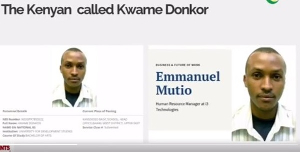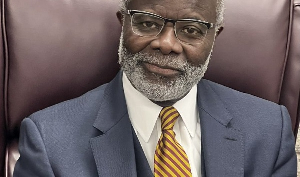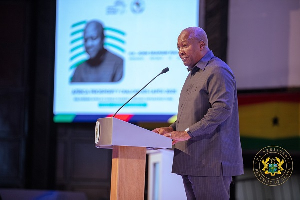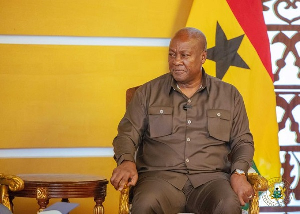The general notion that somehow Ghanaians with dual citizenship suffers from some conflict of interest between the country of origin and the adopted country, must be purged from the minds of our fellow Ghanaians, once and for all, since there is no grain of truth in it.
Those who harbour such opinion believe that the Ghanaian holder of dual nationality undergoes an allegiance pledge to the adopted country and therefore cannot be trusted to render similar allegiance to Ghana. Some in this camp even believe that if a dual-nationality Ghanaian gains sensitive position in Ghana that will be the revolving door for Ghana’s interest disappearing into the adopted country. They argue that a Ghanaian British Member of Parliament in Ghana, for example, cannot be trusted to negotiate important deals with Great Britain because they have sworn an allegiance to Britain. A lot, also, believe that the expatriates made a deliberate choice to adopt the host country as theirs, and should therefore not complain if Ghana withdraw citizens rights from them. At the extreme end in this school of thought, are those who want no track with Ghanaians with dual citizenship, because they see them as betrayers of mother Ghana.
This red herring must be nailed because the scenarios painted are not only unrealistic; they are a distortion of the truth to make life unnecessarily difficult for the expatriate, either due to ignorance or some selfish interest. Those expatriates who opt for dual nationality usually do so out of necessity and not out of choice. It is a fact that many Ghanaians find it relatively easy to travel around the globe with their adopted countries’ passport than with the Ghanaian Passport. Ghanaians enjoy hassle-free at the ports of major economic blocks like the European Union countries if they carry their adopted country’s passport; So If the expatriate’s job involves a lot of travelling, it makes economic sense that they seek to reduce the travel time, the cost of visa application and the unwarranted lengthy interrogation that third world passport holders are subjected to, at the ports of the developed world. Hence a Ghanaian pledging allegiance to the host country is trading for all the convenience that such allegiance bring, to enable them to function properly in the host country.
It is not a choice between the country of origin and the adopted country as some may believe. Nobody turn their back on a country and family that nurtured them to life. In the same way that a parent will not disown a blood daughter when they adopt another child as a daughter (through some tedious paper work); the Umbilical cord that holds Ghanaians abroad to Ghana is not broken, when they adopt the host nation as their own. The expatriate’s family tree that is firmly rooted in Ghana, is not suddenly uprooted and catapulted to the adopted country because circumstances have changed for the Ghanaian living abroad. The strong bond with Ghana will never weaken for the expatriate because of the loyalty, love and believe Ghanaians have for extended family.
When a Ghanaian takes a vow to respect the values of the adopted country, there is no clause that stops him/her from extending the same sentiments to Ghana. The allegiance to mother Ghana of Ghanaians living abroad remains intact in spite of the adoption of another country. It is nonsensical to judge allegiance by a piece of paper. Allegiance should be judged on the evidence on the ground: what the person stands for; the interest they champion; their connectivity and how it impacts on their strong bond to Ghana; etc; The ridiculous notion about conflict of interest, in respect of a Ghanaian-British MP, for example, involved in say a legal tussle with Britain, should be seen as a far-fetched scenario. When a Ghanaian British decide to serve in Ghana Parliament, that person will have no business serving in Westminster Parliament. So there is no question of two masters being served. Negotiation will only be conducted on behalf of Ghana and in the interest of Ghana because the Ghanaian British is an MP in Ghana and not Great Britain, so let’s get real and stop the hair-raising scenarios.
It is unfair to judge the expatriates harshly for wanting to improve their circumstances abroad in order to function well in the adopted country. Their conscious decision to formally respect the values of the adopted country should not be seen as a betrayal of the values that they grew up with in Ghana. There is certainly no conflict in respecting the values of both home and away countries. This is the more reason why I made the call in my previous article entitled ``Is Ghana law bench full of robots?’’ for the law on dual citizenship to be clarified with specific amendment to the definition of a Ghanaian.
I am glad most of the respondents made a serious attempt to debate the issue on whether the Law as it stands on who qualifies as a Ghanaian, needed a change. Some, however, were of the wrong opinion that the article was a floodgate for the tongue bashing of the Judge in Mr Dramani’s case. Nothing could be farther from the truth! The reference to Mr Dramani’s case was about the interpretation of the Law; and how some laws should not be viewed as sacrosanct when any lay person can point to the weakness in them. It must be pointed out that the grounds for disqualification as an MP in respect of Mr Dramani, was that he was not a Ghanaian in view of his dual citizenship status. At least, that was the news carried by most media reporters. So I stoked the debate about what constitutes a Ghanaian.
`` The 1992 constitutional law regarding the rights of citizens of Ghana became open to different interpretation with the subsequent update of the Citizenship Act 2002 (Act 591), which for the first time recognised and restored citizen’s rights to holders of Dual Citizenship, who register with an agency of Ghana such as the consulate. The updated 1992 constitutional law conferred citizen’s rights to holders of dual nationality as opposed to the original 1992 Act, which did not give recognition to it. Hence the updated law, by implication, recognised holders of dual nationality as Ghanaians when it gave those voting rights, travelling rights and all the other rights enjoyed by Ghanaians that the original 1992 constitution denied them. However, the definition of a Ghanaian was left unchanged with the update and this is where the confusion arises. Hard liners want to go by the letter of the law without consideration for the rights now enjoyed by registered holders of dual nationality.
On the other hand, those of us asking for the spirit of the law to be the top consideration are doing so in the light of the new rights that registered holders of dual nationality now enjoy. When the law becomes open to different interpretation as this updated constitutional law is, it is imperative on Judges to allow public interest to be their guide as they look beyond the letter of the law. It is not a question of IFs... and BUTs....; the good Judge is duty bound to take the spirit of the law into consideration in delivering a judgement, when the law is open to interpretation. This is where the Judge in the Dramani’s case should have looked at evidence such as deep-rooted family tree in Ghana, custom in parliament, the 40000 vote of confidence by his constituents, his personal bond to the state such as business connection and other patriotic act in the past’’.
The above quote is from Mr Asante, who, so beautifully, took the words from my mouth in response to a dinosaur lawyer, who is still employing the ancient 1992 constitutional law to dismiss Mr Dramani’s case. Another liberal minded, Awuradi Kasa JD, ask pointedly those who cling to the letter of the archaic law, how the law will deal with Bogus foreigners like Nigerians, Liberians, Malians, Chadians, etc masquerading as Ghanaians with fraudulently obtained Ghana passport and Birth Certificate, who make a stand for the MP job. Will the court say that these Nigerians, Liberians fraudsters have a right to be MP because they have a Ghanaian Passport and Ghana birth certificate and no question about dual citizenship? Or will the court take a more substantial look at things like history of the men, family roots and other connectivity to Ghana before arriving at a judgement? If the court goes by the letter of the law, in this scenario, all the Nigerians, Malians, Chadians, etc, who fraudulently obtains Ghanaian status, will fill Parliament. Conversely, if the court looks beyond the letter of the law and ask for collaborative evidence, the fraudulent Ghanaian will be kept out of Parliament, and this is the flip side of the argument in favour of looking beyond what is printed in black and white in the law.
For me, Patriot closed the argument in favour of allowing the Spirit of the law to be the principal guide in the Appeal court in deciding the fate of Mr Dramani with the following: ``It is dinosaur Judges and Lawyers that are impeding progress in Ghana. They hang on to antiquated laws and ideas like leeches. The Citizenship Act 2002, effectively, made the 1992 Constitutional law on Citizens, REDUNDANT. So all related matters in the constitution no longer hold true for the 21st century Judge or Lawyer. The conservatives in the judicial system must, therefore, stop living in the past and move Ghana forward. They should acknowledge that the updated law in 2002 has shifted the ground for the kind of argument they put forward. Mr Dramani’s Case is now down to the interpretation of the law! This is a battle between the Liberal and Conservative Judges and lawyers in the Justice system.
The defence team will be making a very big mistake to fight on the ancient 1992 law. It is the substance of the law and not the skeleton of the law that must now apply. Mr Dramani was disqualified as an MP because the ancient law did not recognise him as a Ghanaian. The updated version of the same law in 2002 gave him all the rights of a Ghanaian in spite of his dual citizenship status. So the issue before the court should be the proof that he is a Ghanaian. And there is ample evidence that exist to demonstrate, substantially, that Mr Dramani is a Ghanaian. This is where the defence team should focus and not try to fight the plaintiff on the dinosaur law. On the face of it there has been a travesty of justice and the Appeal Court must redress it, by kicking the original 1992 law to touch. Miscarriage of Justice does occur even in advance countries, so there is no shame in admitting to it’’.
He went on to say he will advise those punching nails into the coffin of Mr Dramani’s career as an MP to end it, because Mr Dramani’s career as an MP is not dead yet, unless the defence team make the mistake of fighting on the wrong turf of the law (i.e. The Redundant 1992 constitutional law). I couldn’t agree more with Patriot! Mr Dramani’s defence team should expose the weakness of the original 1992 law and its inappropriateness to deliver justice in their specific case; because of the new rights enjoyed by dual citizenship holders registered with an agency of Ghana.
It is absurd to refer to a Ghanaian by birth, with deep-rooted family in Ghana, ample evidence of strong connection to the state; and 40,000 votes of confidence by sane Ghanaians able to judge who a Ghanaian is, as a foreigner, regardless of the citizenship status. The law must, therefore, unequivocally recognise this concept, in explicit terms, to remove the cloud surrounding it. The ball is now in the court of the Appeal court, if they pass it to Parliament, the politicians should rise to the challenge and change the law for the long term interest of Mother Ghana. Ghanaians can't be slaves to the law, it is the law that must serve the interest of Ghanaians. Mr Dramani is a Ghanaian in substance and in every sense of the word; hence he deserves to have his interest as a Ghanaian protected by the law irrespective of any artificial citizenship status, he may have acquired over the years.
Kwaku Frimpong
Opinions of Wednesday, 29 July 2009
Columnist: Frimpong, Kwaku


















